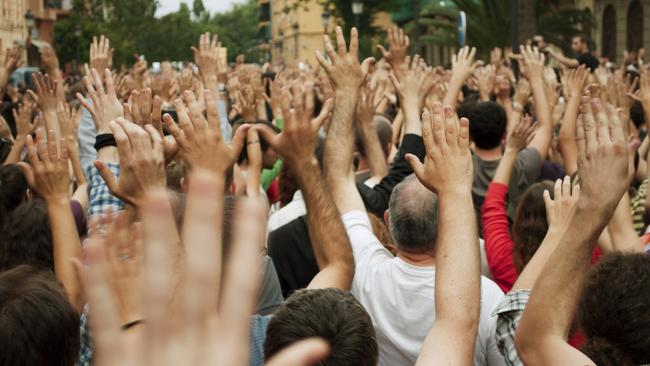Talking Point: Protest Bill rehash fails to clear the air
BRENDAN GOGARTY: Taking the hatchet to Tasmanian protest Bill has addressed some problems, but created as much confusion

Opinion
Don't miss out on the headlines from Opinion. Followed categories will be added to My News.
IMAGINE this: a screenwriter has their script rejected on the grounds that it is confusing and unworkable. However, instead of responding to this rejection by rewriting the script from scratch, the author issues a set of instructions about to properly read the original screenplay; whole passages are to be carved out, new scenes inserted, characters changed, and acts restructured. Rather than a new, clean manuscript, the reader is left with a copy of the rejected script and the amending one and the confusing job of patching it together.
Is this a begrudging and inappropriate response by the screenwriter to the script’s rejection? Completely. Does it risk creating even more of a mess than before? Absolutely. Is it likely to be rejected a second time? Quite possibly.
Yet that is the approach the Government has taken to rewriting its anti-protest laws after they were soundly rejected by the High Court in 2017 on the grounds they were confusing, unworkable and unconstitutional.
This all became clear on Monday (a public holiday when a significant parts of the state were on fire), when the Government quietly released the draft Workplaces (Protection from Protesters) Amendment Bill 2019. Perplexingly, instead of starting afresh, the Government has chosen to take a hatchet to the 2014 legislation, and rebuild it from the inside out. The problem is, so much of the old law was expressly or impliedly invalid, that the new Bill is a thicket of amending provisions almost as long as the original (which it has to be read alongside). It’s like a multidimensional, do-it-yourself, choose-your-own adventure book of befuddlement. Perhaps that was the point; perhaps it wasn’t. Either way it is a somewhat ironic approach to redrafting a law which was struck down by the High Court for being “drafted in a way that may initially leave a person unsure of their effect” to the level of “Pythonesque absurdity”.
Never in my life have so many people contacted me not for my opinion of the proposed law, but simply an explanation of what it means; that includes seasoned lawyers and political journalists and commentators. Tasmania, you can do better than this.
None of this is to say the new Bill doesn’t address some pretty serious shortcomings of the original, not least by shifting its focus from punishing protesters to protecting businesses– at least in form, but probably much less in spirit. On its face it also narrows down the sorts of places protected by interference – namely business premises and business vehicles. However, it continues to cast a broad net over where that interference can occur from; namely from any “public place”, including a sidewalk, street or waterway. It also does not require the interference to be complete or even effective, a partial interference of a shop from a thoroughfare say, is enough. Worryingly the bill would also create a new, standalone offence of “threatening” to interfere with a business, regardless of whether this actually happens or not. This suggests the law may drift dangerously into regulating public expression rather than actual physical acts of interference.
Some arguably more beneficial parts of the old law have also apparently been thrown out, possibly unintentionally, in the rehash/redraft process; most importantly the ability of the police to direct people away from a protest site before charging them with interference. It also doesn’t set out guidelines for police to determine when a person is genuinely intending to interfere with a business or not. This may cause problems for officers who have to make on-the-spot decisions about whether to prosecute people for hefty and significant criminal penalties, including $10,000 in fines and up to 18 months in prison.
Basically, if passed, the Bill would criminalise any interference or threat of interference to a business, however minor, and for whatever reason without warning or direction to move on. The Bill would cover a kayaker paddling beside an oil rig; a truck driver parked outside a petrol station honking about diesel prices; or just someone arguing with a cashier they’ve been overcharged and refusing to move on until they’ve been given a refund. In fact, it would criminalise even threatening to do these things, in person or on social media.
While this may frighten some, in many ways it simply makes the old law a bit more egalitarian and, consequently, potentially a little more constitutionally acceptable. Anyone who interferes with a Tasmanian business is captured by the new Bill, regardless of which side of politics they’re on.
That said, there are some real uncertainties created by this Bill, not least because of the way the Government has chosen to go about re-drafting it. There’s a good chance the resulting law will be as overly broad, confusing and uncertain as the original. The breadth and reach of the law, and its clear balance in favour of business over civil rights, also raises red flags.
Assuming the Government bunkers down and maintains this approach then it may very well find itself before the High Court again. Given the hundreds of thousands of dollars (at least) lost to the failed defence of this Bill’s predecessor, it may be worth considering whether this script deserves a second reading at all.
The draft Workplaces (Protection from Protesters) Amendment Bill 2019 is open for public comment until March 3 and is available at www.justice.tas.gov.au/community-consultation
Dr Brendan Gogarty is a constitutional lawyer, a senior lecturer in law at the University of Tasmania and Tasmanian convenor of the Australian Association of Constitutional Law.


